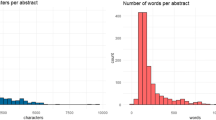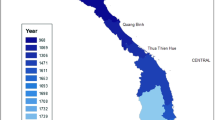Abstract
The objective of this paper is to study the variability of peoples’ basic social values as reflected in data from our past surveys on national character. Among other issues, I focus on trust systems in order to explore which aspects of sense of trust are stable and which aspects are variable under longitudinal changes in economic or political conditions. First, I explain peoples’ general response tendencies based on our survey on national character, which is a key to the understanding of our survey data in the context of cross-national comparisons. Secondly, I summarize some aspects of people’s sense of interpersonal trust from our longitudinal survey of Japanese national character. Thirdly, I present cross-national comparisons of interpersonal and institutional trust as well as some basic social values based on our past surveys, including surveys of seven-countries (Japan, USA and five European countries), the East Asia Values Survey (EAVS) (2002–2005) and the Asia-Pacific Values Survey (APVS) (2004–2008). The results show that East Asian countries have already departed from traditional Confucianism and that people share more common social values beyond the distinction of East and West. Fourthly, I present an overview of data on Japanese immigrants in Brazil, Hawaii and the U.S. West Coast in order to study the interaction between the environment and ethnicity. Fifthly, I provide some comments for our future research.
Similar content being viewed by others
References
Almond, G.A. & Verba, S. (1963). Civic culture. Boston: Little Brown.
Banfield, E.C. (1958). The moral basis of a backward society. NY: The Free Press.
Dowds, M. (1986). Buriea no kaihou-sya-tati [Liberation army of Briar]. Bunsyunn-bunko. Tokyo: Bungeisyunjyuu (in Japanese).
Dentsu-Soken & Yokakaihatsu Center (Eds.). (1999). Kachi-kan chosa deita [Data of world value survey] (in Japanese).
Dogan, M. (2000). Deficit of confidence within European democracies. In M. Haller (ed.), The making of the European union (pp.243–261). Paris: Springer-Verlag.
Fugita, S.S. & Fernandez, M. (2004). Altered lives, enduring community: Japanese Americans remember their World War II incarceration (Scott and Laurie Oki Series in Asian American Studies). Seattle: University of Washington Press.
Fugita, S.S., Kashima, T. & Miyamoto, F.S. (2002). Methodology of comparative studies of national character. Behaviormetrika, 29, 143–148.
Fugita, S.S., Miyamoto, F.S. & Kashima, T. (2002). Interpersonal style and Japanese American organizational involvement. Behaviormetrika, 29, 185–202.
Fukuyama, F. (1995). Trust. NY: Free Press.
Gallup, G.H. (1977). Human needs and satisfactions: a global survey. Public Opinion Quarterly, winter, pp.459–467.
Guillen, M.F. (2001). Globalization civilizing, destructive or feeble? A critique of five key debates in the social science literature. Annual Review of Sociology, 27, 235–260.
Hayami, T. & Miyamoto, M. (1988). Industrial Revolution. Tokyo: Iwanami-syoten (in Japanese).
Hayashi, C. (Ed.) (1973). A study of Japanese-Americans in Honolulu, Hawaii. ISM Research Report General Series, No.33. Tokyo: ISM (in Japanese).
Hayashi, C. (1992). Suuryou-ka [Hayashi’s quantification method]. Asakura-syoten (in Japanese).
Hayashi, C. (1993). Nihon-jin no kokuminnsei [Japanese national character]. Phase’ 93 (in Japanese).
Hayashi, C. (2001a). Nihon-jin no kokuminsei kenkyu [a study on the Japanese national character]. Tokyo: Nansou-sya (in Japanese).
Hayashi, C. (2001b). De-ta no kagaku [The Science of Data]. Tokyo: Asakura-syoten (in Japanese).
Hayashi, C. & Iriyama, A. (1997). Koueki hojin no jitsuzo [The Reality of NPO]. Tokyo: Daiamond-sha (in Japanese).
Hayashi, C. & Kuroda, Y. (1997). Japanese culture in comparative perspective. C T: Praeger.
Hayashi, C. & Yamamoto, K. (1993). Research on national character of Japanese Brazilian — 1991&1992 —. ISM Research Report General Series, No.74.
Hayashi, C., Yoshino, R., Suzuki, T., Hayashi, F., Kamano, S., Miyake, I., Murakami, M., & Sasaki, M. (1998). Kokuminsei nanaka-koku hikaku [cross-national comparison of seven nations]. Tokyo: Idemitsu-syoten (in Japanese).
Hosmer, L.T. (1995). Trust: the connecting link between organizational theory and philosophical theory. Academy of Management Review, 20, 379–403.
Ichida, N., Yoshikawa, G., Kobayashi, S., Hirai, H., & Kondo, K. (2005). Social capital and health — A survey of the 32,000 senior people in the Chita peninsula (Aichi prefecture) —. http://www.nihonfukushi-u.jp/coe/report/pdf/200510272.pdf
Inaba, Y. (2002). Japan and economy of trust. Tokyo: Toyo-keizai-sinpou-sya (in Japanese).
Inkeles, A. (1997). National character. New Brunswick: Transaction Publishers.
Kashima, T. (2003). Judgment without trial: Japanese American imprisonment during World War II (The Scott and Laurie Oki Series in Asian American Studies). Seattle: University of Washington Press.
Kawachi, I., Kennedy, B.P., Lochner, K. & Prothrow-Smith, D. (1997). Social capital, income inequality, and mortality. American Journal of Public Health, 87, 1491–1498.
Kitano, H.H.L. (1993). Generations and identity: The Japanese American. MA: Ginn Press.
Kuroda, Y. (2002). The rainbow model of American ethic groups. Behaviormetrika, 30, 39–62.
Kuroda, Y. & Suzuki, T. (1991a). Arab student and English: The role of implicit cultures. Behviormetrika, 18, 23–44.
Kuroda, Y. & Suzuki, T. (1991b). A comparative analysis of the Arab culture: Arabic, English and Japanese languages and values. Behviormetrika, 18, 35–53.
Miyamoto, F.S. (1984). Social Solidarity among the Japanese in Seattle. Seattle: University of Washington Press.
Miyamoto, F. (1986). Problems of interpersonal style among the Nisei. Amerasia, 13, 59-45.
Miyamoto, F.S., Fugita, S.S., & Kashima, T. (2002). A theory of interpersonal relations for cross cultural studies. Behaviormetrika, 29, 19–184.
Mizuno, K., Suzuki, T., Sakamoto, Y., Murakami, M., Nakamura, T., Yoshino, R., Hayashi, C., Nishihira, Y., & Hayashi, F. (1992). Dai 5 nihon-jin no kokuminsei [Japanese national character survey V]. Tokyo: Idemitsu-syoten (in Japanese).
Morishima, M. (1984). Naze nihon ha seikou sitaka [Why did Japan succeed]? Tokyo: TBS Britannica (in Japanese).
NORC-ROPER (1986). General social surveys, 1972-1986: cumulative codebook. The Roper Center for public opinion research, University of Conneticut.
Osaka Shogyo University & Tokyo University (1999). The Japanese version of general social survey (JGSS). The second preliminary survey, simple tabulation & codebook.
Rosenberg, M. (1956). Misanthropy and political ideology. American sociological review, XXI, 690–695.
Rotter, J.B. (1971). Generalized expectations for interpersonal trust. American Psychologist, 26, 443–452.
Sakamoto, Y., Nakamura, T., Tsuchiya, T., Maeda, T., & Fouse, D.B. (Eds.) (2000). A study of the Japanese national character: the tenth nationwide survey (1998). ISM Research Report, General Series, No.85.
Shapiro, S. (1987). The social control of interpersonal trust. American Journal of Sociology, 93, 623–658.
Sasaki, M. & Suzuki, T. (2000). Social attitudes in Japan. Boston: Brill.
Weber, M. (1904-05). The Protestant ethics and the spirit of capitalism [translated by T. Parsons]. Routledge Classics.
Yamamoto, K. & Hayashi, C. (ed.) (1993). Research on national character of Japanese Brazilians 1991 & 1992. ISM Research Report No.74.
Yamaoka, K. (2000). Variation in attitudes and values among Japanese Americans and Japanese Brazilians across generations. Behaviormetrika, 27, 125–151.
Yoshino, R. (1992). Superculture as a frame of reference for cross-national comparison of national characters. Behaviormetrika, 19, 23–41.
Yoshino, R. (1994). An overview of the longitudinal studies of national character by ISM (in Japanese). Proceedings of the Institutional Statistical Mathematics, 42, 259–276.
Yoshino, R. (Ed.) (2000). A study of statistical science on cultural transmission. The ISM Research Report No.84. Tokyo: ISM.
Yoshino, R. (Ed.) (2001a). A study of statistical science on cultural transmission based on social survey data of National Character. A report submitted to The Ministry of Education, Culture, Sports, Science & Technology.
Yoshino, R. (Ed.) (2001b). Hawaii Resident Survey 1999-2000. The ISM Research Report, No.86. Tokyo: ISM.
Yoshino, R. (2001c). Kokoro wo hakaru [Measuring the mind]. Tokyo: Asakura-syoten.
Yoshino, R. (2002). A time to trust — a study on peoples’ sense of trust from a viewpoint of cross-national and longitudinal study on national character —. Behaviormetrika, 29, 231–260.
Yoshino, R. (2003). A time to trust. Eco-Forum, Vol.22, No.1, a special issue: Social capital part II, pp.42–51. Tokyo: Tokei-kenkyu-kai (in Japanese).
Yoshino, R. (2005a). East Asia Values Survey — For the development of Behaviormetric study of civilization on the Cultural Manifold Analysis (CULMAN) —. Japanese Journal of Behaviormetrics, 32, 133–146 (in Japanese).
Yoshino, R. (2005b). A time to trust in the East Asia — A Behaviormetirc study on the sense of trust in the East Asia Values Survey —. Japanese Journal of Behaviormetrics, 32, 147–160.
Yoshino, R. (2006). A social value survey of China — on the change and stability in the Chinese globalization —. Behaviormetrika, 33, 111–130.
Yoshino, R. (2008a). National character and environmental issues — For policy-making to accept cultural manifold —. Environmental Information Science, 37, 21–26 (in Japanese).
Yoshino, R. (2008b). Obake-chosa saikou (Reconsideration on a spirit survey). Shi-jyo chosa (Marketing Research), 273, pp.4–13. Tokyo: Yoronn-kagaku-kyoukai (in Japanese).
Yoshino, R. [ed.] (2007). The cross-national comparison of the East Asia — Science of data —. Tokyo: Bensei-syuppan (in Japanese).
Tsunoda, H., Yoshino, R., & Yokoyama, K. (2008). Components of social capital and sociopsychological factors that worsen the perceived health of Japanese males and females. Tohoku Journal of Experimental Medicine, 216, 173–185.
Zucker, L.G. (1986). Production of trust: institutional sources of economic structure. Research in Organizational Behavior, 8, 53–111.
Author information
Authors and Affiliations
Corresponding author
About this article
Cite this article
Yoshino, R. Reconstruction of Trust on a Cultural Manifold: Sense of Trust in Longitudinal and Cross-National Surveys of National Character. Behaviormetrika 36, 115–147 (2009). https://doi.org/10.2333/bhmk.36.115
Received:
Revised:
Published:
Issue Date:
DOI: https://doi.org/10.2333/bhmk.36.115




